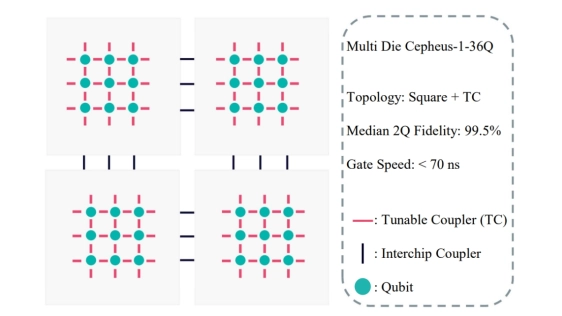Optimizing Inter-chip Coupler Link Placement for Modular and Chiplet Quantum Systems
By Zefan Du 1, Pedro Chumpitaz Flores 2, Wenqi Wei 1, Juntao Chen 1, Kaixun Hua 2, Ying Mao 1
1 Fordham University, New York, NY, USA
2 University of South Florida, Tampa, FL, USA

Abstract
 Quantum computing offers unparalleled computational capabilities but faces significant challenges, including limited qubit counts, diverse hardware topologies, and dynamic noise and error rates, which hinder scalability and reliability. Distributed quantum computing, particularly chip-to-chip connections, has emerged as a solution by interconnecting multiple processors to collaboratively execute large circuits. While hardware advancements, such as IBM's Quantum Flamingo, focus on improving inter-chip fidelity, limited research addresses efficient circuit cutting and qubit mapping in distributed systems. This project introduces InterPlace, a self-adaptive, hardware-aware framework for chip-to-chip distributed quantum systems. InterPlace analyzes qubit noise and error rates to construct a virtual system topology, guiding circuit partitioning and distributed qubit mapping to minimize SWAP overhead and enhance fidelity. Implemented with IBM Qiskit and compared with the state-of-the-art, InterPlace achieves up to a 53.0\% improvement in fidelity and reduces the combination of on-chip SWAPs and inter-chip operations by as much as 33.3\%, demonstrating scalability and effectiveness in extensive evaluations on real quantum hardware topologies.
Quantum computing offers unparalleled computational capabilities but faces significant challenges, including limited qubit counts, diverse hardware topologies, and dynamic noise and error rates, which hinder scalability and reliability. Distributed quantum computing, particularly chip-to-chip connections, has emerged as a solution by interconnecting multiple processors to collaboratively execute large circuits. While hardware advancements, such as IBM's Quantum Flamingo, focus on improving inter-chip fidelity, limited research addresses efficient circuit cutting and qubit mapping in distributed systems. This project introduces InterPlace, a self-adaptive, hardware-aware framework for chip-to-chip distributed quantum systems. InterPlace analyzes qubit noise and error rates to construct a virtual system topology, guiding circuit partitioning and distributed qubit mapping to minimize SWAP overhead and enhance fidelity. Implemented with IBM Qiskit and compared with the state-of-the-art, InterPlace achieves up to a 53.0\% improvement in fidelity and reduces the combination of on-chip SWAPs and inter-chip operations by as much as 33.3\%, demonstrating scalability and effectiveness in extensive evaluations on real quantum hardware topologies.
To read the full article, click here
Related Chiplet
- Interconnect Chiplet
- 12nm EURYTION RFK1 - UCIe SP based Ka-Ku Band Chiplet Transceiver
- Bridglets
- Automotive AI Accelerator
- Direct Chiplet Interface
Related Technical Papers
- FoldedHexaTorus: An Inter-Chiplet Interconnect Topology for Chiplet-based Systems using Organic and Glass Substrates
- Modular Compilation for Quantum Chiplet Architectures
- 3D-ICE 4.0: Accurate and efficient thermal modeling for 2.5D/3D heterogeneous chiplet systems
- Codesign of quantum error-correcting codes and modular chiplets in the presence of defects
Latest Technical Papers
- Thermo-mechanical co-design of 2.5D flip-chip packages with silicon and glass interposers via finite element analysis and machine learning
- High-Efficient and Fast-Response Thermal Management by Heterogeneous Integration of Diamond on Interposer-Based 2.5D Chiplets
- HexaMesh: Scaling to Hundreds of Chiplets with an Optimized Chiplet Arrangement
- A physics-constrained and data-driven approach for thermal field inversion in chiplet-based packaging
- Probing the Nanoscale Onset of Plasticity in Electroplated Copper for Hybrid Bonding Structures via Multimodal Atomic Force Microscopy